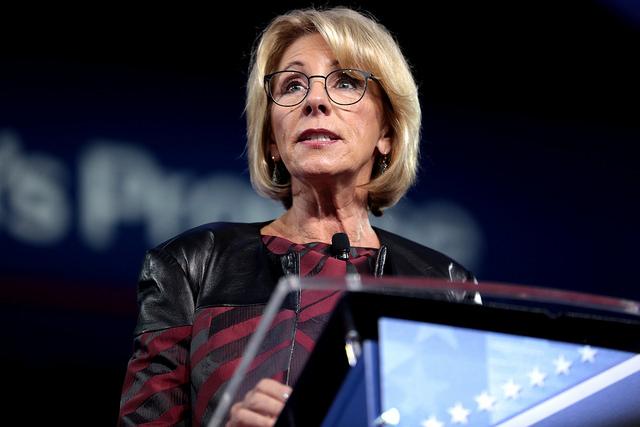Not entirely unexpectedly, the Department of Education under Secretary Betsy DeVos rescinded the infamous 2011 “Dear Colleague” letter regarding procedures for handling cases of sexual misconduct on campus under Title IX, issuing new interim guidance in its place.
The previous policy document was widely credited as the impetus for colleges and universities to take sexual misconduct more seriously, but has since seen some criticism for setting up a system of adjudication that unfairly punishes the falsely accused as its recommendations were put into practice.
The announcement was swiftly denounced by many — particularly on the left — as dangerous, misguided and permissive to rapists. The office of Sen. Tammy Baldwin, D-Wis, tweeted disapproval on Saturday.
Betsy DeVos’ rollback of #TitleIX protections hurts the fight to end campus sexual assault and sends the wrong message to survivors. https://t.co/WXNqwiRNA8
— Sen. Tammy Baldwin (@SenatorBaldwin) September 22, 2017
On Friday, Fatima Goss Graves, president and CEO of the National Women’s Law Center, said in a press release, “This interim guidance will have a devastating impact on students and schools. It will discourage students from reporting assaults, create uncertainty for schools on how to follow the law, and make campuses less safe.”
Federal government should be stepping up for transgender rights, not backing down
These kind of statements are hyperbolic and careless. The interim guidance maintains that schools should have a dedicated Title IX coordinator, places the burden of investigating sexual misconduct on the school rather than victims and still suggests schools make special accommodations for students filing a complaint based on circumstance — as well as for the accused, which the previous guidance ignored.
However, it also insists schools protect the due process rights of the accused by clearly informing them of which rules they are accused of violating, and states clearly that schools should not impose gag orders to prevent accused students from talking about their case.
It once again permits — but does not require — schools to use the “clear and convincing evidence” standard, meaning there must be substantially more evidence in favor of guilt than innocence to take disciplinary action. This is compared to the previous document, which demanded a “preponderance of the evidence” standard, meaning even slightly more evidence of guilt could result in punishment.
None of this harms victims of sexual assault nor ends protections under Title IX.
Overlooked in all of this is that the previous guidance seemed to have had a particularly negative impact on racial minorities.
According to Colgate University’s records, in the 2013-2014 academic year, black male students were accused of 50 percent of the sexual violations reported to the university, but only made up 40 percent of the students formally adjudicated. These disproportionate numbers, which were found highly statistically significant despite the small sample size, suggest black students are much more likely to be accused.
However, the majority of students accused of sexual assault are overwhelmingly white males — 57 percent, according to RAINN.
This seems to be playing out in the handling of these cases, as Atlantic contributing editor Emily Yoffe noted in a recent article titled The Question of Race in Campus Sexual-Assault Cases, where she explains that minority and international students are particularly vulnerable to these kind of investigations due to lack of resources and potential bias.
While many Republican-appointed officials have a somewhat iffy history of dealing with women’s issues, this reform should be seen as a welcome exception to that history. The way this process has been conducted does not suggest the Trump administration is pro-sexual assault.
The new interim guidance appears fair and free from malice, and takes steps to ensure the investigation process does not unintentionally and disproportionately violate the civil rights of men, racial minorities and international students who may be innocent, while still protecting the victims of violence and abuse.
Nobody wants rapists to go free, but that’s not what happened this weekend.
Amanda Love ([email protected]) is a senior majoring in mathematics.








